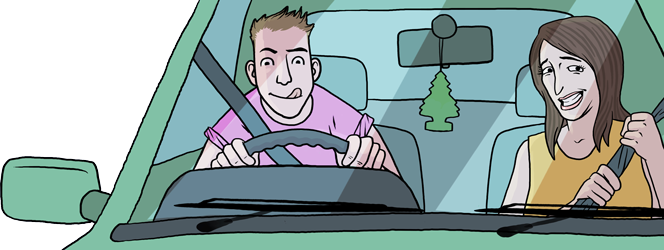
What makes a good driver?
Driving is hard. It is. Over the years we develop an instinct for it, but even the most experienced driver can make silly (and dangerous) mistakes.
It's even harder for a young driver - mechanical processes, hazard perception, predicting other drivers' behaviour, reacting calmly to scary situations...gah!
The paradox is we often praise people for passing their driving test quickly, completely missing the point that it is the experience gained through a longer learning process which is likely to be their biggest saving grace.
Nick Rowley
Drive iQ founder
-
Anticipation
Indentifying and avoiding potential hazards is the mainstay of safe driving. The driving test isn't an assessment of how well you operate a machine (though that stuff is pretty necessary); it's to make sure you can keep yourself and other road users safe.
You can help your child with their hazard perception from way before they start driving lessons and way after they pass their test. Online software like Drive iQ will get the brain into safety mode.
Not got a child on the road yet? Get help with starting the learning process early.
Concentration
Distracted driving is a common problem with younger drivers but it affects us all to some extent. Whether you're using your hands-free, eating a sandwich or fiddling with the satnav, anything that means you don't have both hands and both eyes on the road ahead is reducing your driving safety.
Unfortunately, a young driver's brain hasn't yet completely developed the pathways that let them plan out consequences and avoid danger. That makes it even more likely they'll use their phone, get sidetracked by their mate's conversation or take any number of 'little' risks.
Staying 100% focussed on the road requires constant work. If you're tired, upset or excited, chances are you've not got your mind on the job. Knowing when to leave driving for a bit to wake up or calm down is vital.
-
Confidence
It's not what a lot of people think confidence is: charging along at 70, weaving in and out of traffic and bombing it around corners. Driving confidence is actually more about not feeling pressured to do that stuff.
Sticking to your guns when someone is tailgating you, pushing you to go over the speed limit. Saying no when a friend urges you to take a risk. THAT is driving confidence.
These important values can be established through your own driving. How you deal with other road users is especially impactful - it's how your child is going to deal with them too. Be the best example of a confident driver.
Get some advice for helping your child deal with peer pressure in the car.
-
Consideration
Yup, a bit of old fashioned politeness. So many driving situations are frustrating and it's easy to get riled up. Unfortunately, getting mad makes us do silly things that can get us into trouble
Starting out with an attitude of keeping some perspective is a good way to keep calm. My mum always says "You don't know what kind of day they're having," and the thought that a driver who has made me cross could be distracted because their wife is sick or they just lost their job always (nearly always) reigns in my rage.
We all make mistakes, we all do things without thinking about how they will affect other people. No one can say they're the perfect driver, so we need to remember to cut each other some slack on the road. And let people out of junctions sometimes. Karma!
Adaptability
No road is the same every day. Weather, school timetable, crops, events, road works - everything is changing all the time. Being aware and alert for these changes, rather than driving in autopilot is very important for staying safe.
Learning to drive gives you a set of rules. Being able to apply those rules to new situations is tricky but necessary.
If a young driver gets through their driving test quite quickly, it's not unlikely that they'll have only driven in 1 season, which doesn't prepare them for the drastic changes they could see - and have to face alone. You can help them with private practice, which will give them experience of different times of day, and you could also offer to do some driving with them after they pass to help them with new conditions.









